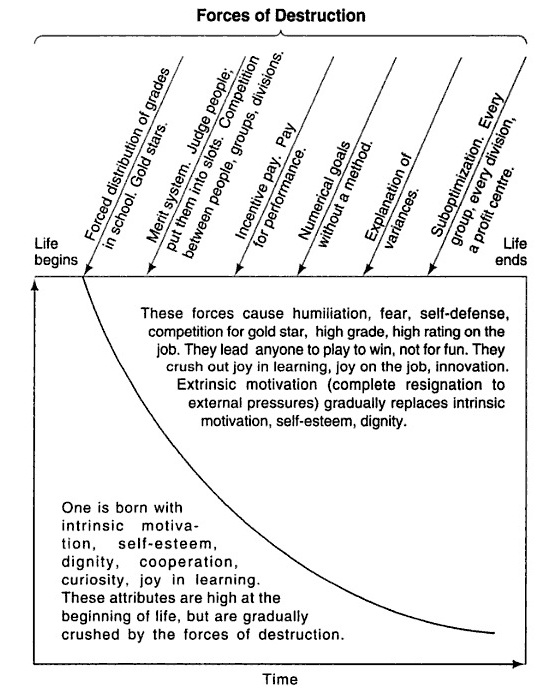Simon Black –
If we are working in conservation that is because we want things to get ‘better’ for species or ecosystems or at least (if circumstances move the goalposts) ‘different’ and ‘sustainable’. It could be really difficult to find the best way to manage – the path of management learning over the past 40 years is littered with passing fads and trends which have only delivered disappointment, but a few ideas outlast these comings-and-goings.
Nearly thirty years ago I first encountered the work of Dr W Edwards Deming whilst I sat in an undergraduate management lecture in the late 1980s. I have had the opportunity over the intervening decades to apply, test, avoid, seek alternatives or attempt enhancements to Deming’s ideas (and those of many other management practitioners and theorists). Some of my work has been in small departments or projects, others in very large organisations; some in conservation, others in industrial, commercial, or educational contexts. My own thinking has emerged from a growth in understanding.

Deming, born in 1900, was an active communicator, teacher and consultant well into his 90s. His seminars and lecture tours were still in demand from international audiences until his death in December 1993, a couple of weeks after I passed my PhD viva. Deming continues to get a good hearing based on his books written over 30 years ago.
A freshly edited book which pulls together his collected papers was published in 2013. His illustration (Figure 1) of how a person’s motivation withers over their lifetime under “forces of destructive management thinking” rings as true today as in previous decades.Whislt grading systems and merit awards are less familiar in a conservation setting (although we should be aware of the impact of financial incentives on community partners and land-users), competition, goals, variation and suboptimisation of work are all very relevant. How many times do project budgets get unevenly distributed to the detriment of the work being undertaken for species or ecosystems. The Po’ouli is just one example of this (Black et al 2011).
Deming’s books draw on his teaching conducted over 60 years ago in industrial recovery of Japan, ideas which arose from concepts developed by his professional mentor Walter Shewhart at Bell Telephone Laboratories over 80 years ago. Shewhart’s own book published in 1931 is a classic, (its style perhaps less accessible to present-day readers). The observations and principles identified by Shewhart and Deming early in the 20th Century still stand up to scrutiny and practice. Their centenary approaches…
… much more than can be said for many management ideas since.
Further reading:
Black, S. A., Groombridge, J. J., & Jones, C. G. (2011a). Leadership and Conservation Effectiveness: Finding a Better Way to Lead. Conservation Letters, 4, 329-339. http://dx.doi.org/10.1111/j.1755-263X.2011.00184.x
Deming W.E. (1982) Out of the Crisis, MIT CAES, Cambridge MA.
Deming W.E. (1994) The New Economics for Industry, Government, Education, 2nd Ed , MIT CAES, Cambridge, MA.
Deming W.E. (2013) The Essential Deming: leadership principles from the father of quality, Ed J. N. Orsini, McGraw-Hill, NY
Shewhart, W. (1931) Economic control of quality of manufactured product. Van Nostrand Company, New York.